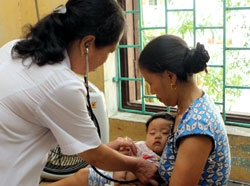
The development of a family doctor system in Viet Nam was handicapped by inadequate Government support, said a health expert at a recent workshop in the capital city.
 |
| A doctor examines a child at the Ninh Binh Paediatrics and Obstetrics Hospital. The healthcare sector will create more favourable conditions to develop family medicine in the coming years. |
The development of a family doctor system in Viet Nam was handicapped by inadequate Government support, said a health expert at a recent workshop in the capital city. But, if present plans prevail, change is on the way.
According to the Ministry of Health, few students are attracted to study the subject in medical schools. Only about 500 doctors have been trained in family medicine throughout the nation in the past 10 years, an incredibly low number compared to the needs of a population of more than 80 million.
Many medical graduates refuse to work as family doctors at local clinics due to this lack of support and the fear of being forced under Government schemes to work in poor and remote communities.
"The country has no family-doctor system," said director of the HCM City Medical and Pharmaceutical University's Family Doctor Centre Pham Le An. "A family doctor cannot even send patients with serious diseases to hospitals for treatment. That is such a barrier," An said.
Deputy director of the National Paediatrics Hospital, Pham Nhat An, said the nation's few family doctors were general doctors who worked in health clinics at the grassroots level.
The director of the Family Medicine Faculty of the Hue Medical and Pharmaceutical University, Nguyen Minh Tam, said family doctors should be trained to manage common diseases and ailments.
Director of the ministry's Medical Services Administration, Luong Ngoc Khue, said that if family doctors received more recognition, they could help screen patients, sending them to higher levels if necessary and reducing hospital overload.
"The development of a family-doctor model would stabilise and improve the quality of people's health-care and protection at the grassroots level," said Khue.
Pham Le An added that a proper family-doctor system would reduce the working load on specialists and lower treatment fees.
During the next four years, the Ministry of Health plans to carry out a family doctor pilot project in Ha Noi, Hai Phong, Da Nang, Thua Thien Hue, Can Tho and HCM City.
It aims to improve the quality of primary health care for the common people and ease the country's pressing problem of overloaded hospitals.
Health Minister Nguyen Thi Kim Tien said the health sector would create favourable conditions to attract students to study and work in family medicine.
Tien said special benefits should be given to those who pursued family medicine in medical schools
According to a ministry draft, family doctors would become part of the ministry's health-care system. Patients who used their services would be covered by health insurance.
Medical-school graduates who study family medicine for an extra 18 months would also receive a family-doctor certificate.
General doctors trained in family medicine could practise in provincial hospitals or could open or work at round-the-clock health clinics. Family doctors could also work both in State or private medical units
The minister said that the ministry would allow family doctors to send patients to hospitals.
(Source: VNS)



